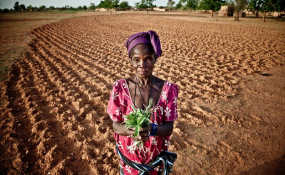Rural Burkina Faso is battling more frequent and ever-longer droughts. The dry season, which traditionally lasted from mid-February to June, is increasingly extending into July and August, delaying the start of much-needed rainfall for planting.
Crops frequently dry up or are attacked by insect pests, rendering most of the harvest useless.
Farmers in the country’s northern Passoré province are getting a helping hand through one-day “plant clinics”, which allow them to bring in damaged crops for a consultation.
The initiative is part of the Building Resilience to Climate Extremes and Disasters (BRACED) programme, supported by Britain’s Department for International Development.
Erik Dirkx, who works for Welthungerhilfe, a German charity that, along with other partners, helped establish the plant clinic system, said the programme is gaining in popularity.
“The plant clinics took a while to get off the ground but are starting to bear fruit,” he said. “The farmers we speak to appreciate getting expert advice that’s available to them locally.”
TACKLING MALNUTRITION
In a country where over 80 percent of the population relies on subsistence agriculture, persistent droughts also have big implications for hunger.
According to the Food Agriculture Organisation, acute malnutrition in the Sahelian north stands at 9.4 percent for children under five, with over 10 percent considered a serious emergency.
To remedy this, over 100 women from eight villages in the Passoré province are attending twice-a-month nutritional awareness classes taught by volunteers from the local communities.
The classes are part of another BRACED initiative led by Christian Aid, among other non-governmental organisations.
Marie Illy, who teaches one of the outdoor classes in the village of Toessin, shows a group of 30 women, infants and a few men sitting on rugs how to prepare nutritious porridge using millet flour, groundnuts and water.
“We’ve only been teaching these classes for a few months, but so far we’ve seen that about 80 percent of women go on to make the porridge themselves,” said Illy. “Some even teach other women in their village how to do it.”
TRADING GOATS
In the village of Samba, families whose food security is threatened by drought receive vouchers from Christian Aid and its partners to buy goats at a local fair.
Frédéric Tankoano, who works for one of the BRACED partners, said that “for the poorest families, who own a few chickens at most, goats are a valuable commodity.”
The farmers are taught how to raise and milk the animals, so that they can sell them at a profit in a couple years’ time.

